
Margaret Lorraine "Margalo" Gillmore was an English-born American actress who had a long career as a stage actress on Broadway. She also appeared in films and TV series, mostly in the 1950s and early 1960s.
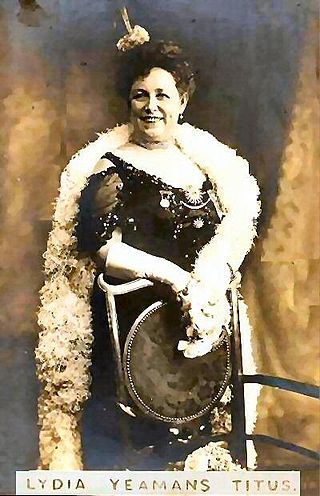
Lydia Yeamans Titus was an Australian-born American singer, dancer, comedienne, and actress who had a lengthy career in vaudeville and cinema. She was remembered on stage for her "Baby-Talk" act and a popular rendition of the English ballad, "Sally in Our Alley". In appreciation, King Edward VII once presented Titus a gold bar pin with the opening notes of "Sally in Our Alley" etched in diamonds. In later life Titus became a pioneer in the medium of film appearing in at least 132 motion pictures between 1911 and 1930.

Josephine Bonaparte Crowell was a Canadian film actress of the silent era. She appeared in more than 90 films between 1912 and 1929.

Laura La Varnie was an American actress of the silent era. She appeared in more than 80 films between 1913 and 1930. She was born in Jefferson City, Missouri and died in Los Angeles, California.

Mary MacLaren was an American film actress in both the silent and sound eras. She was the younger sister of actresses Miriam and Katherine MacDonald and appeared in more than 170 films between 1916 and 1949.

The Petal on the Current is a lost 1919 American drama film directed by Tod Browning.
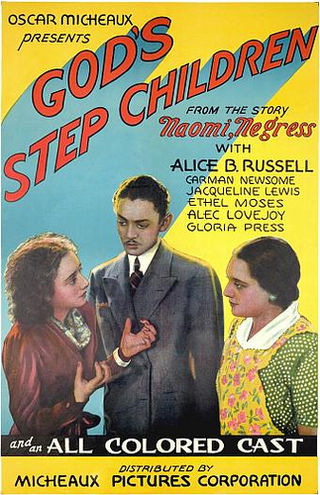
God's Step Children is a 1938 American drama film directed by Oscar Micheaux and starring Jacqueline Lewis. The film is inspired by a combination of elements shared from two previously released Hollywood productions, Imitation of Life and These Three.
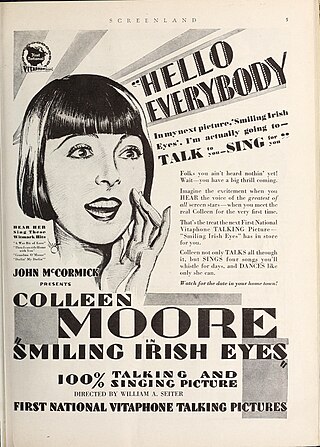
Smiling Irish Eyes is a 1929 American pre-Code Vitaphone musical film with Technicolor sequences. The film is now considered a lost film. However, the Vitaphone audio discs still exist.
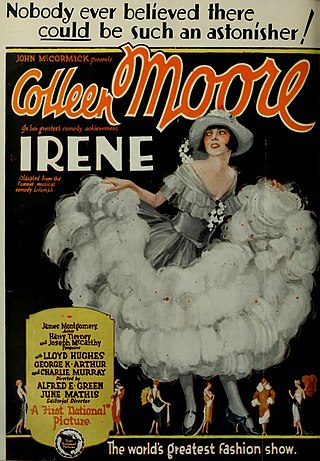
Irene is a 1926 American silent romantic comedy film starring Colleen Moore, and partially shot in Technicolor. The film was directed by Alfred E. Green, produced by Moore's husband John McCormick, and based on the musical Irene written by James Montgomery with music and lyrics by Harry Tierney and Joseph McCarthy.

Behold My Wife! is a 1934 drama film directed by Mitchell Leisen. It stars Sylvia Sidney and Gene Raymond. Based on a novel by Sir Gilbert Parker, The Translation of a Savage, the story had been filmed before in the silent era in 1920 as Behold My Wife! starring Mabel Julienne Scott and Milton Sills. One of the plot's themes is a white man's romance and eventual marriage to an Apache woman.
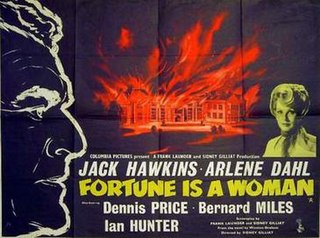
Fortune Is a Woman is a 1957 black and white British-American film noir crime film directed by Sidney Gilliat and starring Jack Hawkins and Arlene Dahl. The screenplay was by Gilliat and Frank Launder, from an adaptation by Val Valentine of the 1952 novel Fortune is a Woman by Winston Graham. Its plot concerns an attempted insurance fraud that goes badly wrong.
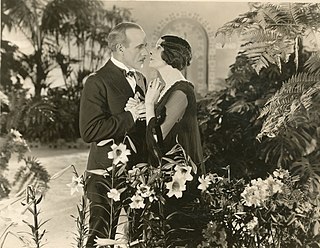
Cytherea is a 1924 American silent romantic drama film directed by George Fitzmaurice and starring Alma Rubens, Lewis Stone, Constance Bennett, and Norman Kerry. Based on the novel Cytherea, Goddess of Love, by Joseph Hergesheimer and was adapted for the screen by Frances Marion. Cytherea features two dream sequences filmed in an early version of the Technicolor color film process. The film is also known as The Forbidden Way.

The Wanters is a 1923 American silent society drama film produced by Louis B. Mayer, directed by John M. Stahl and distributed by Associated First National Pictures, which became First National Pictures in 1924. The film stars Marie Prevost, Robert Ellis, and Norma Shearer.

Georgann Johnson was an American stage, film, and television actress. She was also known as Georgiann Johnson and Georgianne Johnson.

The Arizona Ranger is a 1948 American Western film directed by John Rawlins and starring Tim Holt and his father Jack.
The Christmas Burglars is a 1908 American silent short drama film directed by D. W. Griffith.

The Woman of the Town is a 1943 American Western film directed by George Archainbaud and written by Aeneas MacKenzie. The film stars Claire Trevor, Albert Dekker, Barry Sullivan, Henry Hull, Porter Hall, Percy Kilbride and Clem Bevans.

The Honor of His House is a 1918 American silent drama film directed by William C. deMille and written by Marion Fairfax. The film stars Sessue Hayakawa, Florence Vidor, Jack Holt, Mayme Kelso, Kisaburo Kurihara, and Forrest Seabury. The film was released on 1 April 1918, by Paramount Pictures.

The Woman Thou Gavest Me is a 1919 silent film directed by Hugh Ford and starring Jack Holt, Katherine MacDonald and Milton Sills. It was produced by Famous Players–Lasky and distributed through Famous Players–Lasky and Paramount Pictures. The film is based on the 1913 controversial novel The Woman Thou Gavest Me by Hall Caine, adapted for the screen by Beulah Marie Dix. A song of the same name with words and music by Al Piantadosi promoted the film.

The Grim Comedian is a 1921 American silent drama film directed by Frank Lloyd and starring Phoebe Hunt, Jack Holt, and Gloria Hope.



















